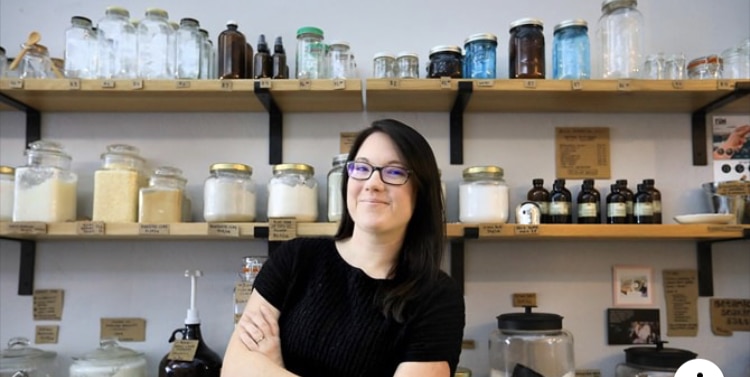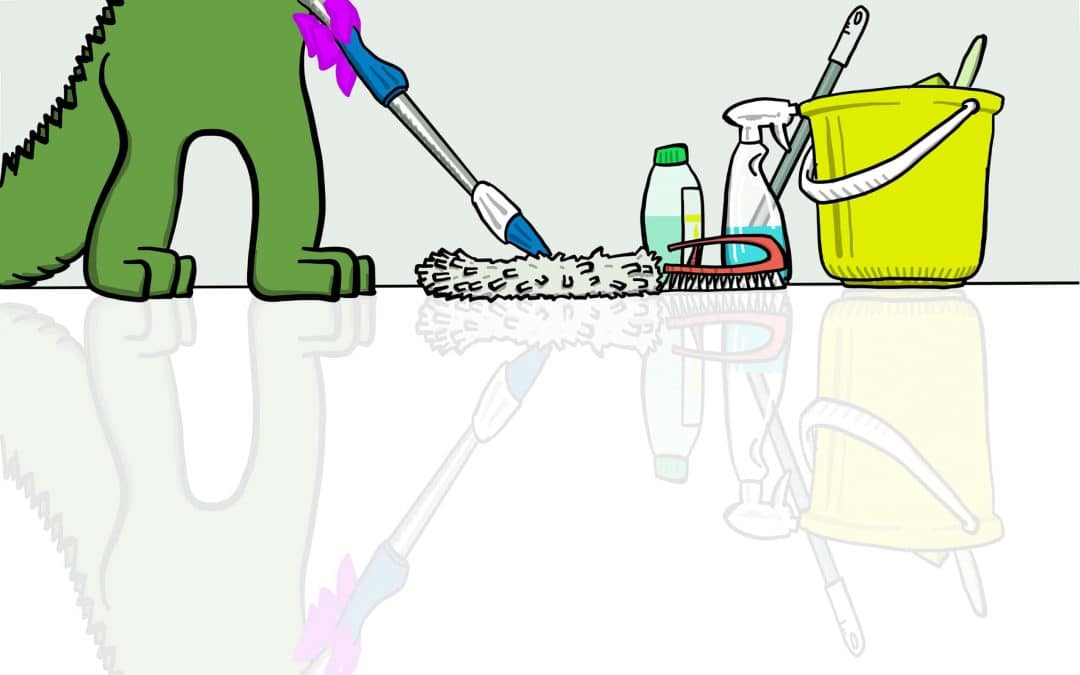How to spring clean your home sustainably
Seventy-eight percent of Americans planned on spring cleaning this year, and that was before the coronavirus pandemic. With many Americans under stay-at-home orders and wanting to protect themselves and their families, cleaning has become a popular pastime. Along with all of that cleaning, trash haulers from Washington, D.C. to St. Paul, Minnesota are reporting an increase in trash from residential areas.
Keeping your home clean and helping reduce the strain on trash systems is easier than you might think. All you need to do is think green, according to Joy Hughes.

LifeUnplastic owner Joy Hughes with some of her bulk offerings.
Hughes is the owner of Gainesville-based Life Unplastic, a retail store that offers reusable, biodegradable, and bulk alternatives for day-to-day needs that you might normally find packaged in single-use plastic packaging or are made from disposable, non-recyclable plastics themselves.
It’s common for people to think that sustainable cleaning products don’t work and are costlier compared to other products, Hughes notes, when in fact the opposite is true.
“Oftentimes [sustainable products] are extra concentrated, so they will actually work with less, which offsets the higher cost,” she said. “I’ve actually saved money using bulk, sustainable cleaning products. At the root of it, ads to get people to buy more and more and more cleaning products are almost too effective, when oftentimes basic white vinegar will do the trick.”
For those that want to use sustainable products in their cleaning routine, Hughes notes there are a wide-variety of products to choose from. In her store alone, Hughes offers bulk Zep disinfectant cleaner, laundry detergent liquids, powders, pods and strips, dish washing liquids, dishwasher pods, block soap, glass cleaner, floor cleaner, gentle home scrub, all-purpose enzyme cleaner, bulk baking soda and vinegar, and even cleaning tools like coconut coir scrubbies and pulp dish towels. To keep your hands clean, she also offers bulk 99.98% isopropyl alcohol which can be mixed with bulk aloe vera gel for a DIY hand sanitizer.
As for the containers used to store these products and before the coronavirus pandemic, Hughes suggested that people could bring their own jars to fill with bulk cleaning products or choose from a selection of “boomerang” recycled jars that other customers bring in and leave at the store for others to use when needed (think the ‘take a penny, leave a penny’ jar you may have seen at stores). She also sells glass jars of multiple sizes and shapes for those who choose to purchase their own reusable containers.
Even though Hughes is working under a stay-at-home order, it hasn’t stopped her from continuing her bulk sales and finding ways to use recycled containers to fulfill the orders she now receives online. Using the “boomerang” jar supply she had on-hand, as well as extra jars customers dropped off when her supply ran low, Hughes has been able to pack orders for bulk supplies and other items from her store. Once the order is fulfilled, customers get their order at a touchless pick up station.
Hughes said the preorder and pick up system has been running very smoothly. So smoothly, in fact, that she wishes she would have done it sooner.
“Honestly, I wish I has started taking preorders (especially for bulk) a long time ago,” Hughes said. “It’s more work, but we get TONS more jar donations and people don’t seem to have an issue with getting stuff in a random jar, so we have been really successful in cultivating a circular economy of glass jars and containers.”
While manufacturers make it easy for Hughes to purchase bulk supplies directly from their warehouses, she noted an ironic issue when she first started purchasing bulk items. Hughes realized that many retailers packaged their bulk products in single gallon jugs, almost defeating the purpose of her mission to use less single-use plastic. Now, she looks for products that are offered in larger volumes.
“It does limit my options to some degree, but it means that 90% of our bulk items come in reusable 5-gallon buckets that so far, we have donated to businesses and customers who have found a use for them and will hopefully use them for a long time,” she said. “The other 10% of the bulk items come in various sized plastic jugs that I make a point to find other uses for. Three makers actually let me return the empty jugs to refill (laundry powder, witch hazel and bug spray). It’s not a perfect system, but I hope I can increase that number of refills/reusables over time and have a demand that enables me to increase my capacity to reusable 50-gallon drums.”
Just as Hughes made the switch from 1-gallon jugs to 5-gallon buckets for purchasing the bulk items she offers in-store, customers can just as easily make the switch from single-use plastic cleaners to sustainable cleaning products.
“As you run out of your current cleaning supplies, make the effort to find a bulk or natural option that is NOT in single-use plastic,” Hughes said. “Google a DIY recipe or come by the store and it would be our pleasure to help you. You are the only thing that can stop you from buying single-use plastic.”
You can check out a few simple homemade cleaning product recipes for items like all-purpose cleaner, glass cleaner, wood cleaner and more from Good Housekeeping, HGTV and Better Homes & Gardens.




